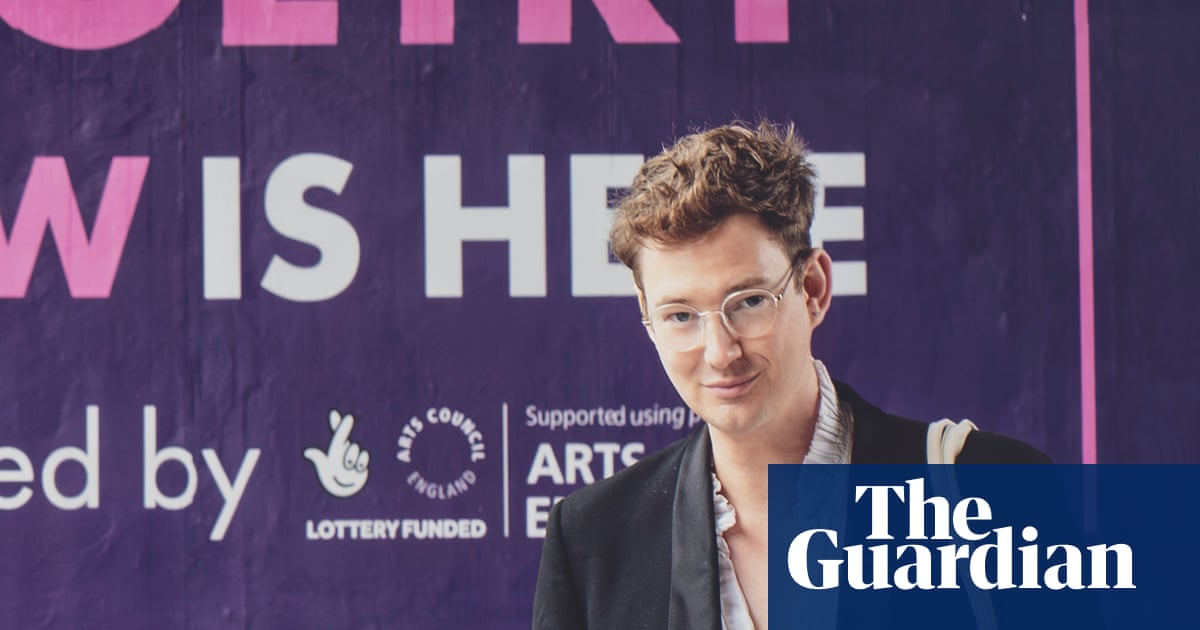One morning in February last year, I received an urgent call from the journalist Paul Burston, alerting me to alarming recent social media posts by a mutual friend, the poet and former model Max Wallis.
It seemed he had left his London flat in deep distress and was headed to a bridge. Our best guess was the Millennium footbridge by St Paul’s Cathedral. Then we heard that Max might have taken refuge inside the cathedral. While I scanned gaggles of tourists in the nave, he was intercepted and removed by ambulance. I was relieved to get a message later that evening that he was safe.
We’d met more than a decade before at an event on the South Bank for the Polari prize, set up by Burston to showcase new LGBTQ+ writers. I and the other judges had shortlisted Wallis’s collection Modern Love. Though the eventual winner was John McCullough, we stayed in touch, going on regular excursions: to Wilderness festival, to readings, to a rooftop art installation in Shoreditch. And always talking about poetry – writing it, reading it, thinking about it, critiquing it.
Now, he tells me about the poetry magazine that emerged from the dark period of addiction that followed his early success. “I lost 12 years of my life, maybe more,” he says over a video call. “The magazine came about from me saying: ‘I have to do something this year; my brain is on fire and it’s running like a hamster wheel.’ I wanted to corral the chaos: how can I find meaning from the ruins of my life?”
After his breakdown, he retreated home to Lancashire. “I had moved in with a friend because I messaged my parents before I went into hospital, saying never talk to me ever again. Instead they opened their arms. My parents were just phenomenal.”
The first imperative was to become clean and sober. He was diagnosed with ADHD and complex PTSD, and gradually rebuilt his life: the first trip into town, getting on a train, taking a driving lesson. But during this period he also rediscovered his craft, channelling his trauma into a memoir and new poems.
“I was a poet all this time but I’d forgotten, essentially. I’m 35 but I almost feel like I’m 21. I have had to learn everything again. In order to be sober, and to get better from PTSD, you sit with the awful emotions that you feel, and you don’t drink or take drugs; you get through the day and move on.”
He started submitting to magazines, but since the new work was themed around breakdown and recovery, Wallis thought only a few poems would get published. With energy to spare (at least on the good days), he began to imagine what a space specifically for trauma poetry could look like. If poetry saved his life, perhaps it could help others. The idea of The Aftershock Review was born.
A poet friend, Anna Percy, had experience of publishing poetry zines in the lively Manchester scene. “No disrespect to those,” Wallis says. “I love zines, but I was thinking bigger, nationwide, book-sized.” Rather than photocopying, he started researching printers. Percy and I joined the magazine as contributing editors and sounding boards, and Wallis put the word out for submissions. Work poured in: from poets who were disabled, disadvantaged, ill, excluded in various ways. The reference anthology was Al Alvarez’s electrifying The New Poetry, which launched Robert Lowell, Sylvia Plath and Anne Sexton to an enthralled readership; Bloodaxe’s Staying Alive series was also hugely admired. “It’s not a pity project,” Wallis insists, calling it “literature forged from survival”.
Established poets were eager to submit, alongside rising stars and unknown writers. Inua Ellams’s “Fuck” poems meld rage, wit and social commentary; Rhian Elizabeth’s Amsterdam states baldly “girl loses her father, girl loses her mind”; Golnoosh Nour’s Burnt Divinities celebrates her heritage: “the glorious / mixture of glitter and garbage”.
The Faber poet and Spectator poetry editor Hugo Williams contributed a sardonic and atypical piece, The Art Scene, which mocks glib responses to trauma in contemporary art. “Max called me up and we had this instant connection,” Williams says. “He seemed different from the average literary type. This kind of writing seems to me to be improvised on the spot and kept like that. People of my generation work so hard to make it perfect, and you wish they wouldn’t!”
Aftershock, he observes, represents a jolt to the mainstream. Contributor Pascale Petit agrees, calling it “a raft to all of us suffering trauma in troubling times. Poetry this open is necessary, and I don’t think any other magazine has dared to address our personal ills so candidly.”
Gwyneth Lewis, a former national poet of Wales, points out that for ages raw, confessional poetry was looked down on as “feminine”: “I’m coming out of a long period of reckoning with lifelong maternal emotional abuse and then chronic illness. I find it deeply encouraging [to realise] that I was in the darkness with so many brilliant poets.”
In the few months of its existence, Aftershock has made an impact – with sales over £3,000, and 360,000 views on Instagram. A giant billboard on Manchester’s Deansgate is seen by thousands daily, and much more is planned for the Aftershock universe: further issues, poetry pamphlets, outreach, events. Perhaps what’s so exciting is that it has tapped into the huge energy and enthusiasm for poetry felt by young writers and readers, who recognise it can be a comfort and release. “Aftershock has given me everything,” Wallis says. “It’s proof that you can take an awful few years and make them into potentially the most astonishing year. Having not wanted to live at all … what it is to choose life over and over again. It’s incredible.”
The Aftershock Review issue one (£12.99) is available from aftershockreview.com
